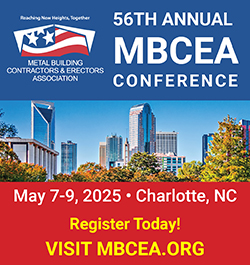UP TO THE MINUTE
Top 5 Employee Hiring Tips - Part 1

By Certified Contractors Network.
Ensuring a successful hire and the essential steps to find a good employee who aligns with your expectations and enhances your work environment.
Whether you are seeking to add a new member to your roofing crew or hire an office assistant, it is essential to find a good employee who consistently fulfills their responsibilities, follows directions, maintains positive relationships with colleagues, and ultimately streamlines your daily tasks.
For instance, what if your new hire struggles to perform their job effectively? Or, what if they make crucial errors in small details? What if they lack teamwork skills, struggle with taking direction or handling criticism? Moreover, what if they simply fail to integrate well with your existing team?
If you hire a talented siding installer, but he never makes it to the job on time and always argues with the project manager, it’s not a good fit, regardless of how impeccable his work is.
That type of employee adds elements of doubt, uncertainty, and stress for everyone else on the job site. He also adds stress for you and your office staff – after all, you’re the one that has to explain why his behavior is acceptable, right?
Employee turnover is also expensive. On-boarding and training a new hire costs time and money. It’s best not to repeat the process often.
There’s never a 100% guarantee any new hire will work out, but you can substantially reduce the risk of a poor fit by following these five best practices.
1 - Understand the job before you hire
Before you can expect a potential hire to jump through your hoops and answer your questions, you have to know what you expect of them. That can include specific installation techniques and equipment qualifications for crew members, but it can also include a list of daily, weekly and monthly tasks for office personnel.
It’s recommended that you come up with a list of tasks the job will entail and skills necessary for the job to help you come up with the job description. What do your crew members have to do regularly? What stresses them out? What do they wish they were better at? By better understanding your current employees, you’re more prepared for the hiring process.
After you hire a new employee, you need to tell them your expectations. You can start explaining expectations during the interview process, but you have to know what those expectations are, first.
Even if you don’t have an HR person, know your policies on time off, vacation, and sick leave. Write those policies down. Make a guidebook that you and your employees, both current and future, can reference at any time. If there’s a policy question, you should have an answer.
Especially before the hiring process starts.
2 - Assessment
Before you interview an employee and research them further, you need to check the credentials they provide. That includes their resume and cover letter, and can possibly include samples of prior work (photos of completed projects, etc).
Resumes can be fabricated, but they can give you some good insights into an employee’s past work and how they think about themselves, former employers, and the work itself. It seems obvious, but you might not want to hire a deck builder who shows contempt for building decks.
When checking a potential new hire’s resume:
- Make sure their listed work experience and skills match the job you’re hiring for. A good potential employee is someone who tailors their resume to the position you’re hiring for. They should demonstrate how their past experience will benefit you, not just put down a generic list of skills and prior job duties. If they try to show how they’re a good fit through their resume, it demonstrates that they’ve put some thought into it. It shows they care.
- Make sure their resume is free of typos and grammatical errors. Someone who takes the time to proofread their resume is someone who’s invested in their own success. It also shows they pay attention to detail and they value the time of whoever’s going over their resume. People aren’t perfect when it comes to spelling and grammar, but you can always tell a strong effort apart from someone who didn’t even run spellcheck.
- Make sure their resume isn’t too boastful. A good employee knows their own strengths, and they should let you know about their skills in a concise, simple way. It should read much more “this is what I can do” than “hey, look at me!” If someone boasts too much on their resume, there’s a greater chance they’re faking it or fabricating something.
- Look for specifics. Potential employees who list real projects as examples of their workmanship are usually good hires. If you’re looking for a new roofer, you want a resume that demonstrates the new hire’s familiarity with different materials and their aptitude for getting a job done on time and under budget. Those things often come up in the interview process, but if they list specifics in their resume, you’ll know their head is in the right place.
- Watch out for padding. Some people pad their resumes with irrelevant information just so they have something to put down on paper. Not every good new hire has 20 years of construction experience, but you should be able to spot the difference between fluff and substance.
Additionally, you’ll want to check for length-of-employment and employment gaps. Some good workers will have a stretch of unemployment, especially with how hard the recession hit the construction and home remodelling industries in some parts of the country. If a roofer didn’t work for six months, that might not be a red flag. But it’s probably a red flag if he only lasted less than a year with all of his previous employers.
If something regarding employment gaps seems suspicious, or you’re just curious about it, ask during the interview process.
Dutifully checking through the materials your potential new hire provides is important, but it doesn’t end there.
3 - Checking references, backgrounds and other essentials
After you’ve gone over a potential new hire’s resume and other materials, it’s time to check their provided references.
If the person you’re screening hasn’t provided references, you have two choices:
- If they seem like they could be a good fit, ask for references. It’s possible they’ve been out of the job search game for a while and didn’t know to include them. It’s also possible they just forgot.
- If you’re on the fence about someone after their resume, and they didn’t provide any references, it’s probably best to move on. You can make better use of your time screening someone else.
Christine Lagorio-Chafkin over at Inc writes:
“Of three references, have a phone conversation with at least two, and pay attention to the tone of their recommendation, not just its content. It’s not necessarily legal to hamper future employment for a past employee, so savvy references won’t say anything negative. As an out, they’ll say very little at all. Some human resources experts recommend checking a reference that’s not recommended: hunt down a person at the applicant’s most recent workplace who knew them well, and ask their opinion as well.”
Also look at the variety of references. Are they all from the same business? Are they from recent contacts, or contacts from the distant past?
CCS Construction Staffing recommends asking references the following questions:
- Was the candidate offered or eligible for any promotions?
- Did he or she work well with co-workers?
- What are the candidate’s strengths and work habits?
- Would the previous employer hire them again?”
Next, it’s time for a background check. There’s a certain amount of background information you can find on your own. Most states have a criminal repository that can tell you about your potential new hire’s criminal background, including traffic violation. Search.org can help you get started.
You can also requisition a background check from a private company. That can be costly, but if you’re looking for a long-term employee, it’s often better safe than sorry.
Many employers also perform a social media check. If that’s something you want to pursue, you have to be careful. If someone you’re screening commonly trashes old employers, demonstrates a negative demeanor, and regularly talks about drug and alcohol abuse, they’re probably not a good fit.
Still, there’s only so much information from social media you can use to screen potential employees.
CCS writes:
“Much of the information on social media cannot be used in the decision-making process. Any clues about sexual orientation, religion and gender can be prominent on social media, but cannot influence your hiring process. If the candidate feels that they were wrongfully discriminated against, they may pursue legal action.”
Stay tuned – There’s more to come
Be sure to check back soon for the second part of our Now Hiring series. Numbers four and five just might be the most important steps of all!
Original article source: Certified Contractors Network
Learn more about Certified Contractors Network (CCN) in their Coffee Shop Directory or visit www.contractors.net.
About Certified Contractors Network
We are a membership of business leaders that aim to enhance the professionalism, performance and perception of the construction and remodeling industry. Our network provides the resources that support our fellow contractors to achieve their highest potential within the industry. 25+ years of elevating the contracting & remodeling business. With a mission of helping contractors build a growing, profitable business and improved quality of life, membership in the Certified Contractors Network delivers the results-driven consulting, training, and tools needed to take your contracting company to the next level.



















Comments
Leave a Reply
Have an account? Login to leave a comment!
Sign In